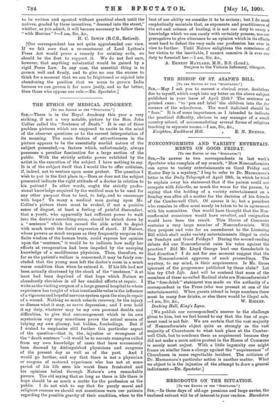THE ETHICS OF MEDICAL JUDGMENT.
[To THE EDITOR OF THE " SPECTATOR:1 Sin,—There is in the Royal Academy this year a very striking, if not a very notable, picture by the Hon. John Collier called the " Sentence of Death." It is one of those problem pictures which are supposed to excite in the mind of the observer questions as to the correct interpretation of its meaning. The main feature of attractiveness in the picture appears to be the essentially morbid nature of the subject presented,—a feature which, unfortunately, always possesses a peculiar fascination for a large section of the public. With the strictly artistic power exhibited by the artist in the execution of the subject I have nothing to say. It is of the subject itself that I would like to offer criticism, if, indeed, not to venture upon some protest. The question I wish to put in the first place is,—Does or does not the subject presented indicate the right attitude of a doctor in relation to his patient ? In other words, ought the strictly profes- sional knowledge acquired by the medical man to be used for any other purpose than to heal, to help, and to encourage with hope ? To many a medical man gazing upon Mr. Collier's picture there must be evoked, if not a positive sense of disgust, at least a feeling of painful discomfort, that a youth, who apparently had sufficient power to walk into the doctor's consulting-room, should be struck down by a "sentence" which has caused the able artist to depict with much truth the facial expression of shock. If Nature, whose powers as much surpass as they frequently surprise the finite wisdom of the human brain, could express her opinion upon the "sentence," it would be to indicate bow sadly her efforts at recuperation had been impeded by the usurping knowledge of a meddlesome physician. Thus, therefore, so far as the patient's welfare is concerned, it may be fairly con- cluded that the young man left the doctor's room in a much worse condition than when he entered it. If his life had not been actually shortened by the shock of the "sentence," it at least had been deprived of that hope which Nature so abundantly cherishes in all her unaided efforts at repair. I write as the visiting surgeon of a large general hospital to whom experience has taught of what inestimable value is the influence of a vigorous and hopeful nervous system upon the simple repair of a wound. Nothing so much retards recovery, be the injury or disease what it may, as nerve depression; and I ever hold it my duty, whatever may be my own personal doubts and difficulties, to give that encouragement which in its own mysterious way may sometimes prove the actual means of belying my own gloomy, but hidden, forebodings. But if I wished to emphasise still further this particular aspect of the question—that is, the, injustice or wrongness of the " death sentence "—it would be to narrate examples culled from my own knowledge of cases that have erroneously been doomed by distinguished physicians and surgeons of the present day as well as of the past. And I would go further, and say that there is not a physician or surgeon of matured experience who has not at some period of his life seen his worst fears frustrated and his opinions belied through Nature's own remarkable powers. The old saying that so long as there is life there is, hope should be as much -a motto for the profession as the public. I do not wish to say that for purely moral and religious reasons we should not sometimes warn our patients regarding the possible gravity of -their condition, when to the
best of our ability we consider it to be serious ; but I do molt emphatically maintain that, as exponents and practitioners of the art and science of healing, it is not our duty to usurp a knowledge which we can rarely with certainty possess, nor our prerogative to give utterance to an opinion which in its effects must tend to defeat the very ends our profession has ever in view to further. Until Nature enlightens the conscience of her victim to the inevitable, I cannot conceive it is ever our duty to forestall her.—I am, Sir, &c.,
A. ERNEST MAYLARD, M.B., B.S. (Loud.),
Surgeon to the Victoria Infirmary, Glasgow.














































 Previous page
Previous page